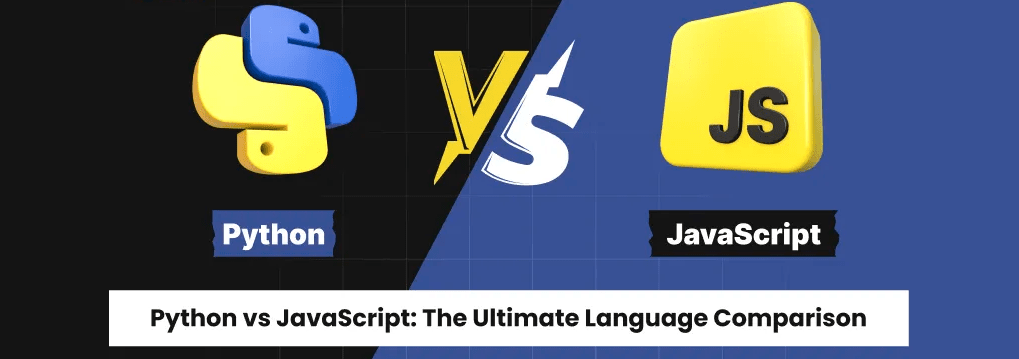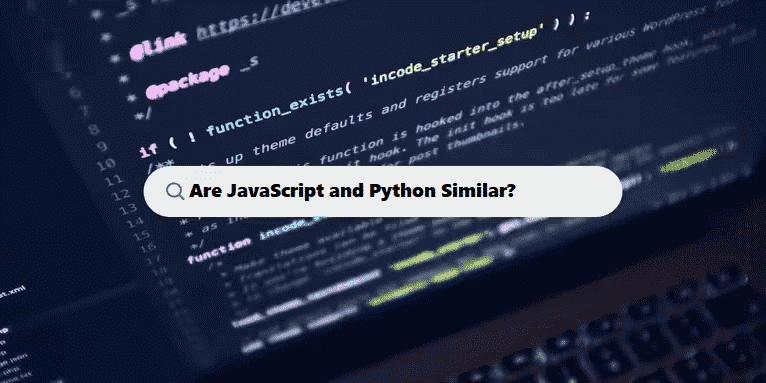JavaScript and Python are both popular, high-level programming languages, but they have distinct differences in terms of their syntax, use cases, and underlying principles. Here’s a comparison:
1. Syntax
- JavaScript: The syntax is influenced by C, so it uses curly braces
{}for code blocks and semicolons;to end statements. JavaScript also usesvar,let, andconstfor variable declarations, withletandconstbeing block-scoped.
#javascript
let x = 10;
if (x > 5) {
console.log("Greater than 5");
}
Python: Python has a simpler, more readable syntax that uses indentation (whitespace) to define code blocks instead of braces. It does not require semicolons at the end of statements and uses = for variable assignments.
#python
x = 10
if x > 5:
print("Greater than 5")

2. Use Cases
- JavaScript: Originally designed for web development to create interactive web pages, JavaScript is now also used in server-side development (e.g., with Node.js), mobile app development (e.g., React Native), and even desktop apps (e.g., Electron).
- Python: Python is widely used in data science, machine learning, web development (with frameworks like Django and Flask), automation, and scientific computing.
3. Typing System
- JavaScript: Dynamically typed, meaning you don’t have to specify the type of a variable when declaring it. However, this can lead to type-related errors.
- Python: Also dynamically typed, but Python has a strong emphasis on readability and simplicity, making it easier for beginners to learn and use effectively.
4. Ecosystem and Libraries
- JavaScript: The JavaScript ecosystem is rich in libraries and frameworks, especially for web development. Popular frameworks include React, Angular, and Vue.js for front-end development, and Node.js for back-end development.
- Python: Python’s ecosystem is vast, especially in data science and machine learning. Libraries like NumPy, pandas, TensorFlow, and PyTorch make Python the go-to language for these fields.
5. Performance
- JavaScript: Generally faster than Python in terms of execution speed because it’s optimized for web browsers, and modern JavaScript engines (like V8) are highly efficient.
- Python: Slower than JavaScript in many scenarios, especially when it comes to raw performance in algorithms or high-performance tasks. However, Python’s simplicity makes it easy to develop rapidly, even if it sacrifices some performance.
6. Execution Environment
- JavaScript: Primarily executed in the browser but can also run on the server side (via Node.js).
- Python: Typically executed in a terminal or through an integrated development environment (IDE) on the server or local machine.
7. Community and Learning Curve
- JavaScript: The JavaScript community is vast, and since it’s essential for web development, there’s a large amount of resources and tutorials available.
- Python: Python is known for its simplicity and beginner-friendly nature, making it an excellent choice for people new to programming. It also has a strong, supportive community.
Note:
- Similarity: Both JavaScript and Python are versatile, high-level, and dynamic languages, with strong communities and a wide array of libraries and frameworks.
- Difference: JavaScript is the go-to for web development, while Python shines in data science, automation, and general-purpose programming.
Ultimately, while they are similar in being interpreted, dynamically typed languages, they cater to different needs in the tech world. The choice between the two depends largely on your project goals and preferred domain.
Developers Simplify Complex Code at Coding Filters!
Developers often struggle with overly complex code that is hard to maintain and debug. By applying coding filters, developers can break down complex tasks into smaller, more manageable pieces, resulting in simpler, cleaner code. Filters help to target specific data or processes, enhancing both performance and readability.




